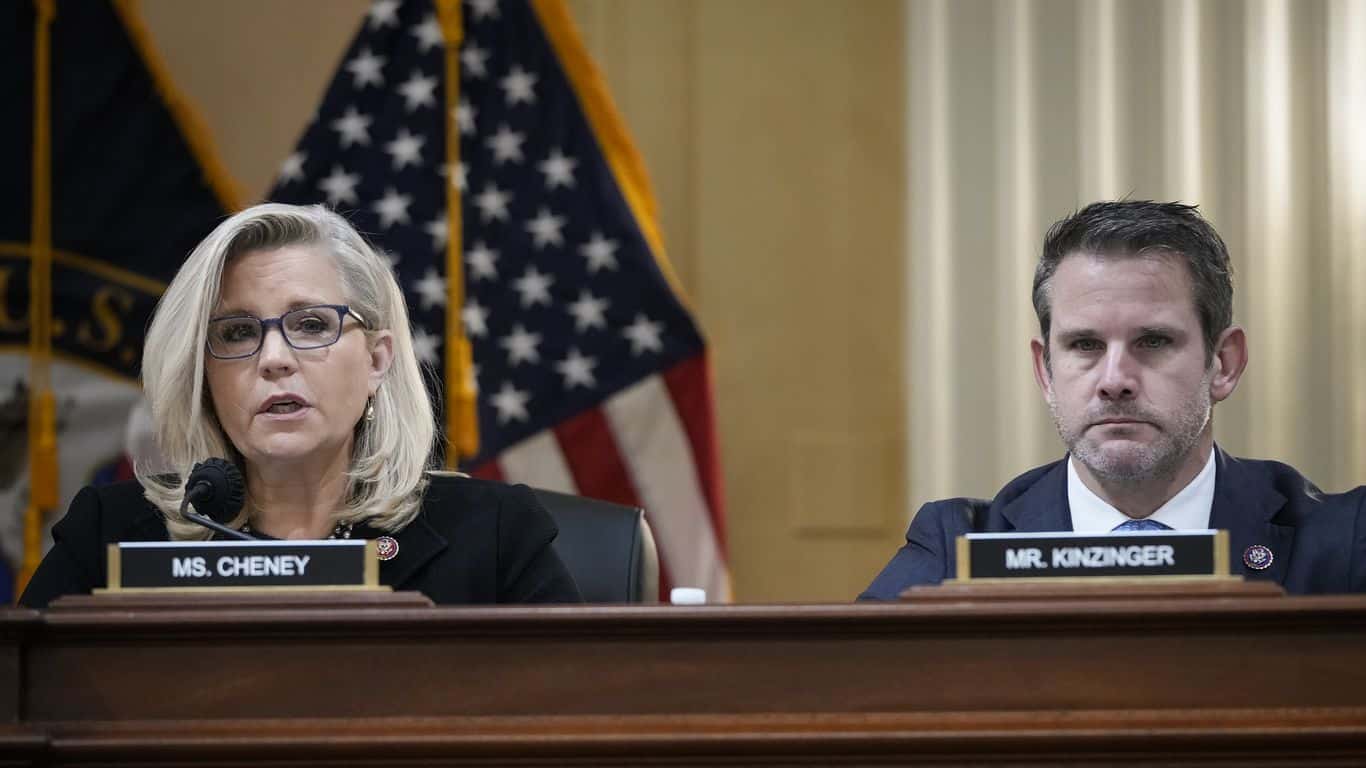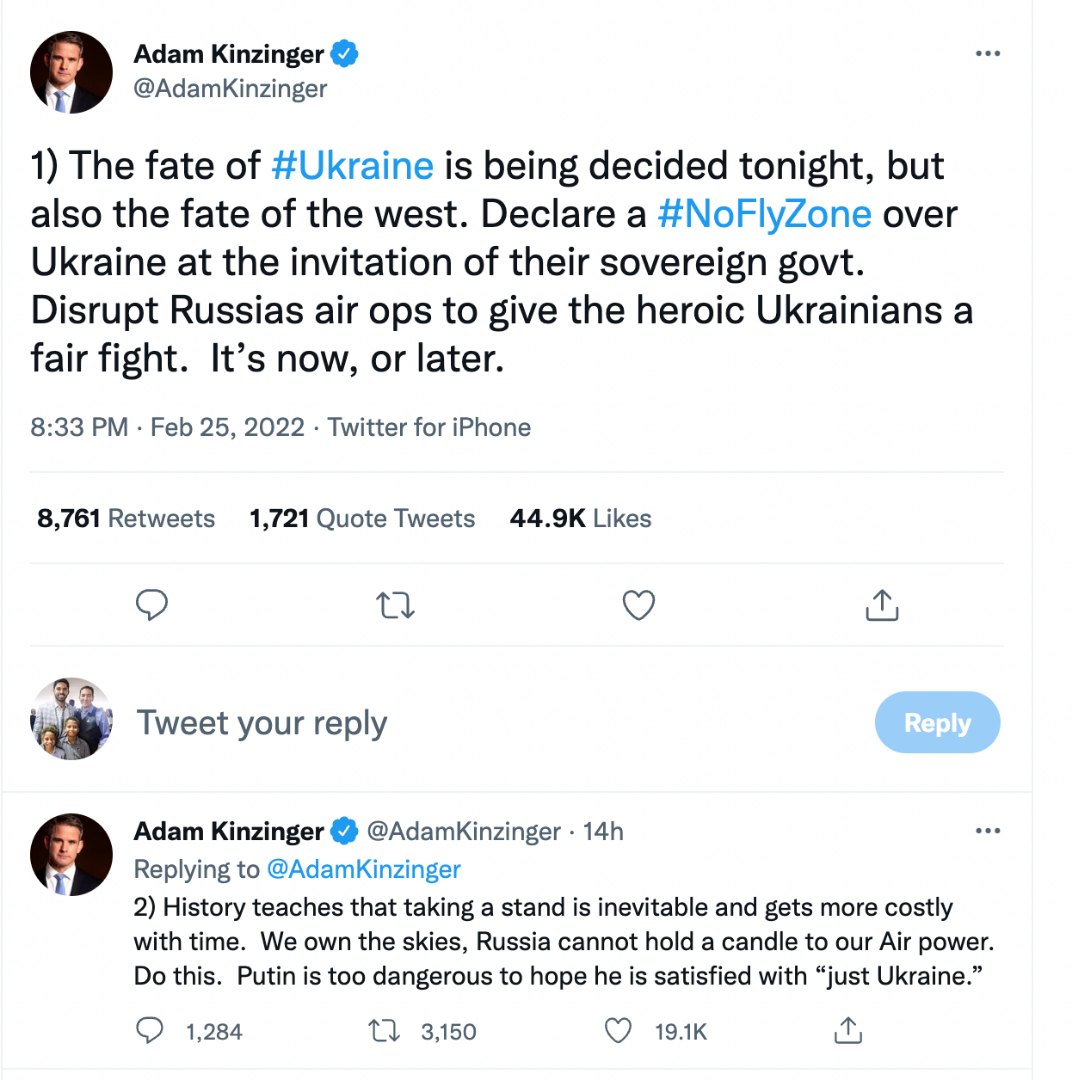
In the weeks leading up to the Russian invasion of Ukraine, those warning of the possible dangers of U.S. involvement were assured that such concerns were baseless. The prevailing line insisted that nobody in Washington is even considering let alone advocating that the U.S. become militarily involved in a conflict with Russia. That the concern was based not on the belief that the U.S. would actively seek such a war, but rather on the oft-unintended consequences of being swamped with war propaganda and the high levels of tribalism, jingoism and emotionalism that accompany it, was ignored. It did not matter how many wars one could point to in history that began unintentionally, with unchecked, dangerous tensions spiraling out of control. Anyone warning of this obviously dangerous possibility was met with the “straw man” cliché: you are arguing against a position that literally nobody in D.C. is defending.
Less than a week into this war, that can no longer be said. One of the media’s most beloved members of Congress, Rep. Adam Kinzinger (R-IL), on Friday explicitly and emphatically urged that the U.S. military be deployed to Ukraine to establish a “no-fly zone” — i.e., American soldiers would order Russia not to enter Ukrainian airspace and would directly attack any Russian jets or other military units which disobeyed. That would, by definition and design, immediately ensure that the two countries with by far the planet’s largest nuclear stockpiles would be fighting one another, all over Ukraine.
Kinzinger’s fantasy that Russia would instantly obey U.S. orders due to rational calculations is directly at odds with all the prevailing narratives about Putin having now become an irrational madman who has taken leave of his senses — not just metaphorically but medically — and is prepared to risk everything for conquest and legacy. This was not the first time such a deranged proposal has been raised; days before Kinzinger unveiled his plan, a reporter asked Pentagon spokesman John Kirby why Biden has thus far refused this confrontational posture. The Brookings Institution’s Ben Wittes on Sunday demanded: “Regime change: Russia.” The President of the Council on Foreign Relations, Richard Haass, celebrated that “now the conversation has shifted to include the possibility of desired regime change in Russia.”
Having the U.S. risk global nuclear annihilation over Ukraine is an indescribably insane view, as one realizes upon a few seconds of sober reflection. We had a reminder of that Sunday morning when “Putin ordered his nuclear forces on high alert, reminding the world he has the power to use weapons of mass destruction, after complaining about the West’s response to his invasion of Ukraine” — but it is completely unsurprising that it is already being suggested.
(bigger)
There is a reason I devoted the first fifteen minutes of my live video broadcast on Thursday about Ukraine not to the history that led us here and the substance of the conflict (I discussed that in the second half), but instead to the climate that arises whenever a new war erupts, instantly creating propaganda-driven, dissent-free consensus. There is no propaganda as potent or powerful as war propaganda. It seems that one must have lived through it at least once, as an engaged adult, to understand how it functions, how it manipulates and distorts, and how one can resist being consumed by it.
As I examined in the first part of that video discussion, war propaganda stimulates the most powerful aspects of our psyche, our subconscious, our instinctive drives. It causes us, by design, to abandon reason. It provokes a surge in tribalism, jingoism, moral righteousness and emotionalism: all powerful drives embedded through millennia of evolution. The more unity that emerges in support of an overarching moral narrative, the more difficult it becomes for anyone to critically evaluate it. The more closed the propaganda system is — either because any dissent from it is excluded by brute censorship or so effectively demonized through accusations of treason and disloyalty — the more difficult it is for anyone, all of us, even to recognize one is in the middle of it.
When critical faculties are deliberately turned off based on a belief that absolute moral certainty has been attained, the parts of our brain armed with the capacity of reason are disabled. That is why the leading anti-Russia hawks such as former Obama Ambassador Michael McFaul and others are demanding that no “Putin propagandists” (meaning anyone who diverges from his views of the conflict) even be permitted a platform, and why many are angry that Facebook has not gone far enough by banning many Russian media outlets from advertising or being monetized. Sen. Mark Warner (D-VA), using the now-standard tactic of government officials dictating to social media companies which content they should and should not allow, announced on Saturday: “I’m concerned about Russian disinformation spreading online, so today I wrote to the CEOs of major tech companies to ask them to restrict the spread of Russian propaganda.” Suppressing any divergent views or at least conditioning the population to ignore them as treasonous is how propagandistic systems remain strong.
It is genuinely hard to overstate how overwhelming the unity and consensus in U.S. political and media circles is. It is as close to a unanimous and dissent-free discourse as anything in memory, certainly since the days following 9/11. Marco Rubio sounds exactly like Bernie Sanders, and Lindsay Graham has no even minimal divergence from Nancy Pelosi. Every word broadcast on CNN or printed in The New York Timesabout the conflict perfectly aligns with the CIA and Pentagon’s messaging. And U.S. public opinion has consequently undergone a radical and rapid change; while recent polling had shown large majorities of Americans opposed to any major U.S. role in Ukraine, a new Gallup poll released on Friday found that “52% of Americans see the conflict between Russia and Ukraine as a critical threat to U.S. vital interests” with almost no partisan division (56% of Republicans and 61% of Democrats), while “85% of Americans now view [Russia] unfavorably while 15% have a positive opinion of it.”
Read the rest here.


